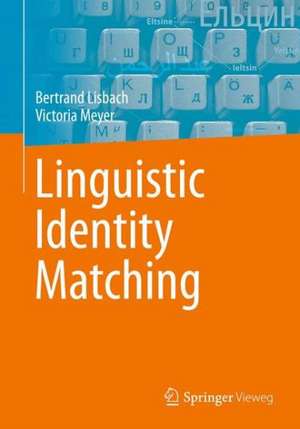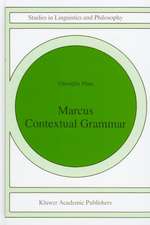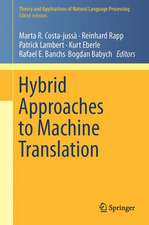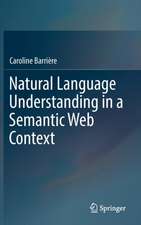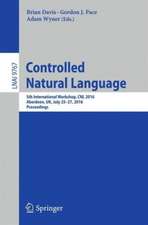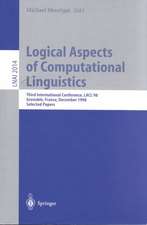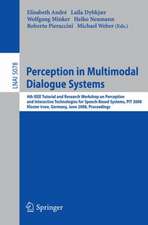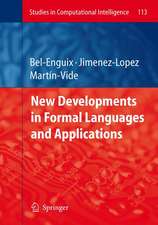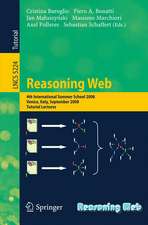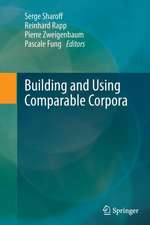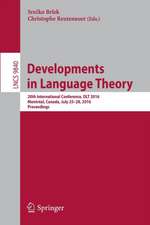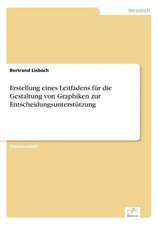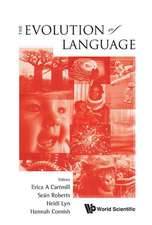Linguistic Identity Matching
Autor Bertrand Lisbach, Victoria Meyeren Limba Engleză Paperback – 17 iun 2013
Over the years, a number of techniques have been developed for searching identity data, traditionally focusing on logical algorithms. These techniques often failed to take into account the complexities of language and culture that provide the rich variations seen in names used around the world. A new paradigm has now emerged for understanding the way that identity data should be searched. This new approach focuses on understanding the influences that languages, writing systems and cultural conventions have on proper names.
A must-read for anyone involved in the purchase, design or use of identity matching systems, this book describes how linguistic knowledge can be used to create a more reliable and precise identity search, and looks at the practical benefits that can be achieved by implementing third-generation linguistic search technology.
Preț: 475.97 lei
Preț vechi: 594.96 lei
-20% Nou
Puncte Express: 714
Preț estimativ în valută:
91.07€ • 95.35$ • 75.36£
91.07€ • 95.35$ • 75.36£
Carte tipărită la comandă
Livrare economică 05-19 aprilie
Preluare comenzi: 021 569.72.76
Specificații
ISBN-13: 9783834813701
ISBN-10: 3834813702
Pagini: 258
Ilustrații: XVII, 244 p. 8 illus., 4 illus. in color.
Dimensiuni: 168 x 240 x 20 mm
Greutate: 0.45 kg
Ediția:2013
Editura: Springer Fachmedien Wiesbaden
Colecția Springer Vieweg
Locul publicării:Wiesbaden, Germany
ISBN-10: 3834813702
Pagini: 258
Ilustrații: XVII, 244 p. 8 illus., 4 illus. in color.
Dimensiuni: 168 x 240 x 20 mm
Greutate: 0.45 kg
Ediția:2013
Editura: Springer Fachmedien Wiesbaden
Colecția Springer Vieweg
Locul publicării:Wiesbaden, Germany
Public țintă
Professional/practitionerCuprins
Introduction: Paradigm Shift in Identity Matching Theory.- Part I: Introduction to Linguistic Identity Matching.- Chapter 1: Basic Concepts.- Chapter 2: The Application of Identity Matching Techniques.- Chapter 3: Introduction to Proper Names.- Chapter 4: Transcription.- Chapter 5: Derivative Forms of Names.- Chapter 6: Phonetically Similar Names.- Chapter 7: Typos.- Part II: Name Matching Methods.- Chapter 8: Name Matching Methods of the First Generation.- Chapter 9: Second Generation Name Matching Methods.- Chapter 10: Third Generation Name Matching Methods.- Chapter 11: Benchmark Study .- Part III: Into the New Paradigm.-
Chapter 12: Name Matching and Identity Matching.- Chapter 13: Evaluation of Identity Matching Software.- Chapter 14: A Linguistic Search Standard.
Chapter 12: Name Matching and Identity Matching.- Chapter 13: Evaluation of Identity Matching Software.- Chapter 14: A Linguistic Search Standard.
Notă biografică
Dr Bertrand Lisbach is CEO of the award-winning Linguistic Search Solutions AG and is an expert in linguistic identity matching. He studied psychology, languages & IT and provides consultancy, system evaluations & solution implementation.
Victoria Meyer is a forensic accountant and Director of SIBAcademy. A former Forensic Technology Director for one of the Big 4 consultancy firms, she has over two decades of experience in the use of identity matching techniques for fraud investigation and AML purposes.
Victoria Meyer is a forensic accountant and Director of SIBAcademy. A former Forensic Technology Director for one of the Big 4 consultancy firms, she has over two decades of experience in the use of identity matching techniques for fraud investigation and AML purposes.
Textul de pe ultima copertă
Identity matching has become an integral part of many business and security processes, from border control and crime investigation to anti-money laundering and client data management.
Following years of struggling with computational techniques, the new linguistic identity matching approach finally offers an appropriate way for such processes to balance the risk of missing an identity match with the costs of overmatching. This new paradigm for searching identity data focuses on understanding the influences that languages, writing systems and cultural conventions have on proper names.
In this book, the authors draw on their many years of identity matching experience to explain why linguistic knowledge is the key to improving both the recall and precision of identity search systems, and how organisations can best harness this knowledge to improve the way they work with identity data.
Content
Part I: Introduction to Linguistic Identity Matching - Basic Concepts - The Application of Identity Matching Techniques - Introduction to Proper Names - Transcription - Derivative Forms of Names - Phonetically Similar Names - Typos - Part II: Name Matching Methods - Name Matching Methods of the First Generation - Second Generation Name Matching Methods - Third Generation Name Matching Methods - Benchmark Study - Part III: Into the New Paradigm - Name Matching and Identity Matching - Evaluation of Identity Matching Software - A Linguistic Search Standard
Target Groups
Compliance Officers
Law Enforcement
Anti-Fraud and AML Professionals
CIOs
Product Managers and Business Analysts
Students and Academics of computer science and linguistics
Authors
Dr Bertrand Lisbach is CEO of the award-winning Linguistic Search Solutions AG and is an expert in linguistic identity matching. He studied psychology, languages & IT and provides consultancy, system evaluations & solution implementation.
Victoria Meyer is a forensic accountant and Director of SIBAcademy. A former Forensic Technology Director for one of the Big 4 consultancy firms, she has over two decades of experience in the use of identity matching techniques for fraud investigation and AML purposes.
Following years of struggling with computational techniques, the new linguistic identity matching approach finally offers an appropriate way for such processes to balance the risk of missing an identity match with the costs of overmatching. This new paradigm for searching identity data focuses on understanding the influences that languages, writing systems and cultural conventions have on proper names.
In this book, the authors draw on their many years of identity matching experience to explain why linguistic knowledge is the key to improving both the recall and precision of identity search systems, and how organisations can best harness this knowledge to improve the way they work with identity data.
Content
Part I: Introduction to Linguistic Identity Matching - Basic Concepts - The Application of Identity Matching Techniques - Introduction to Proper Names - Transcription - Derivative Forms of Names - Phonetically Similar Names - Typos - Part II: Name Matching Methods - Name Matching Methods of the First Generation - Second Generation Name Matching Methods - Third Generation Name Matching Methods - Benchmark Study - Part III: Into the New Paradigm - Name Matching and Identity Matching - Evaluation of Identity Matching Software - A Linguistic Search Standard
Target Groups
Compliance Officers
Law Enforcement
Anti-Fraud and AML Professionals
CIOs
Product Managers and Business Analysts
Students and Academics of computer science and linguistics
Authors
Dr Bertrand Lisbach is CEO of the award-winning Linguistic Search Solutions AG and is an expert in linguistic identity matching. He studied psychology, languages & IT and provides consultancy, system evaluations & solution implementation.
Victoria Meyer is a forensic accountant and Director of SIBAcademy. A former Forensic Technology Director for one of the Big 4 consultancy firms, she has over two decades of experience in the use of identity matching techniques for fraud investigation and AML purposes.
Caracteristici
Linguistic methods reform identity matching How to balance the risk of missing an identity match with the costs of overmatching Linguistic knowledge as the key to improving identity search systems
